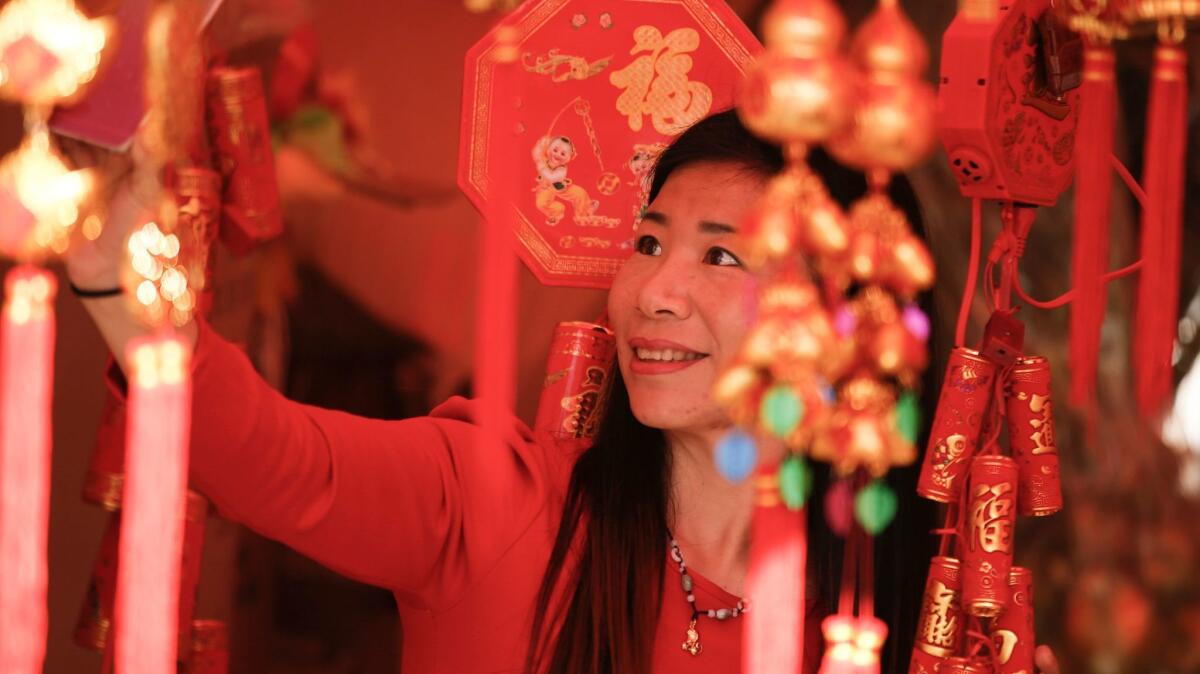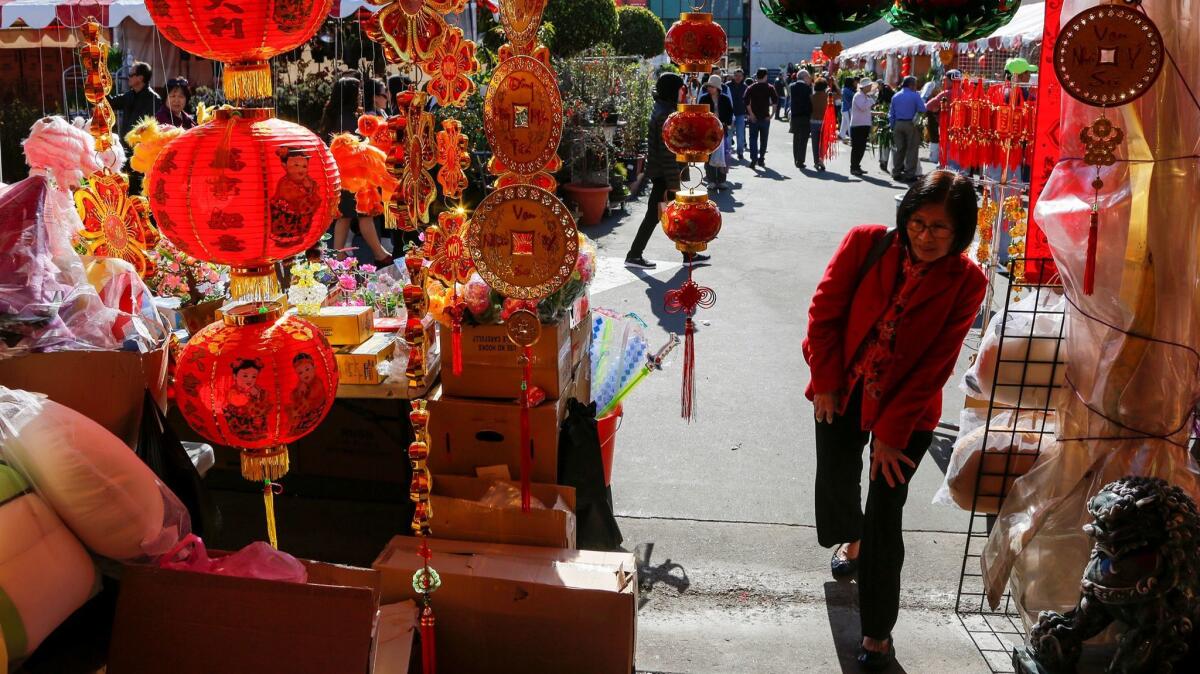Vietnamese prepare for Lunar New Year by paying off debts, a tradition that can often bring stress

As the Year of The Monkey comes to a close and the Year of The Rooster begins, traditional Vietnamese culture dictates that debts must be paid off in order to start the new year with luck. (Video by Mark Boster / Los Angeles Times)
At his kiosk at the Asian Garden Mall, Do Le stood alert, hawking all manner of holiday goods at a bargain price — from paper dragons to bronze roosters to a wide range of “lucky” red envelopes used for stuffing cash.
“What catches your fancy?” Le asked customers at the site, a landmark gathering spot in Westminster’s Little Saigon. “Just $10. That’s nothing like what you owe if you shop somewhere else.”
Vietnamese culture dictates that debts should be paid off before the Lunar New Year, which officially begins Saturday. That left some in Orange County’s sprawling Vietnamese community — the largest outside the Southeast Asian country — frantically trying to wipe clean any outstanding financial obligations.
Others like Le were resigned to “living the American way,” said the 54-year-old vendor. “Here, everyone’s surviving on credit cards.”
Long before his work shift, Le tended to an ancestral altar at his home, as tradition requires, then drove to South Coast Plaza and Westminster Mall to shop for new clothes for his family to celebrate the Year of the Rooster.
“We’ve made it to America,” Le said, brushing aside any cultural pressures to pay off his debts. “We don’t need to worry about these details.”
One long-standing holiday practice, for those who can afford it, is to send money to needy relatives in Vietnam. Phu Nguyen, vice president at Hoa Phat, a money transfer service with four branches across Orange County and 30 branches nationwide, said a quarter of the company’s business comes in the month leading up to Tet.
“It’s gift time,” he said. “Remittances are the only way that people can help family members left in Vietnam. The most important value is sustaining their livelihoods on a daily basis.”

But the holiday can also bring a lot of stress, particularly among those who are struggling financially. Obligations and expectations around Tet, also known as the Lunar New Year, can exceed those at Christmastime in the U.S. said Vu-Duc Vuong, a retired sociology teacher from the Bay Area.
Many in Vietnam are desperately poor and struggle “mightily these days” to pay their debts, Vuong said. Around the holiday, they are “chased by lenders, big or small,” creating a “vicious cycle of borrowing from Peter to pay Paul,” resulting in “the stress and the shame of it all.”
For these reasons, Vuong said he does not favor the push to erase debts.
“It’s an exploitation” of people that only adds to their stress during the holiday, he said.
Duong Nguyen, 42, who was sitting on a bench at the mall enjoying a smoothie, said he was a recent immigrant to the U.S. and lives with his parents. He said they help take care of each other.
“I rely on them,” said Nguyen, who is trying to earn new academic credentials. “In our community, we are used to staying together. If one person can’t pay all the bills, they ask a family member to step up. I believe in New Year superstitions, but this way, we can reduce a little of the bad luck.”
Sitting next to Nguyen, Hoa Le, 85, looked out at a group of aging veterans gathered in front of him at the mall. Le, who served in the Vietnamese Army, relocated to the U.S. 20 years earlier under a State Department humanitarian aid program.
Single with no family, Le said he rents a tiny space inside a mobile home.
“It scares me, the idea of debt,” said Le, who survives on less than $850 a month. “If we can’t pay it, they send us to jail. The American government is very strict when they have their laws.”
Striking a balance between new and old traditions is a constant challenge for the Vietnamese immigrant community.
“Honestly, I’m so Americanized that it’s hard to keep up,” said Annie Diep, a homemaker in Irvine, her feet clad in cozy Uggs as she strolled around the Flower Festival along Bolsa Avenue this week before the holiday. She finally decided on a large arrangement of orchids for her mother for $145.
With holiday traditions, she said, “I do the bare minimum, just to make my mom happy.”

All around her, Asian customers guided their non-Asian friends from stall to stall, providing a running narrative of cultural norms. Visitors from Texas, China and Canada mingled nearby, trying their hand at bargaining.
Johnny Nguyen of Reno, said he and family members drove from Nevada to Westminster to spend Tet with their mother. Being with family is what’s most important to him during the holiday.
“We try to stick with as many traditions as we can,” said Nguyen, a slot machine technician. “It can be stressful to others, but if you work during the year not to have debt, then you won’t have debt.”
His older brother, Andy Nguyen, 69, a casino dealer, said he has put in long hours and budgeted carefully to stay ahead of his family’s needs.
“I’m not boasting, but there’s no debt,” he said. “Being in the U.S., you must learn to manage.”
Twitter: @newsterrier
ALSO
Foods for a Chinese New Year feast
Happy Chinese New Year: Restaurants for noodles, dumplings, chicken, fish and more
Something to crow about: Luxury brands and local shopping centers celebrate the Year of the Rooster
More to Read
Sign up for Essential California
The most important California stories and recommendations in your inbox every morning.
You may occasionally receive promotional content from the Los Angeles Times.











